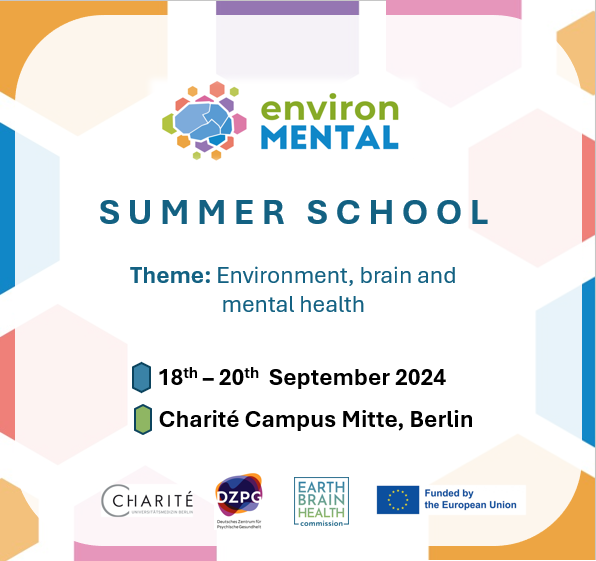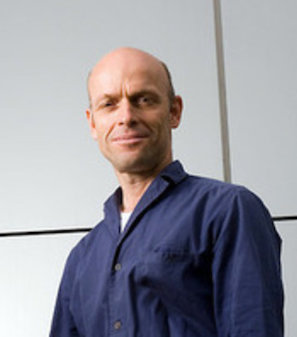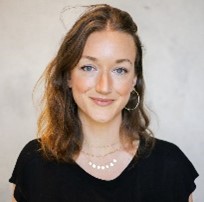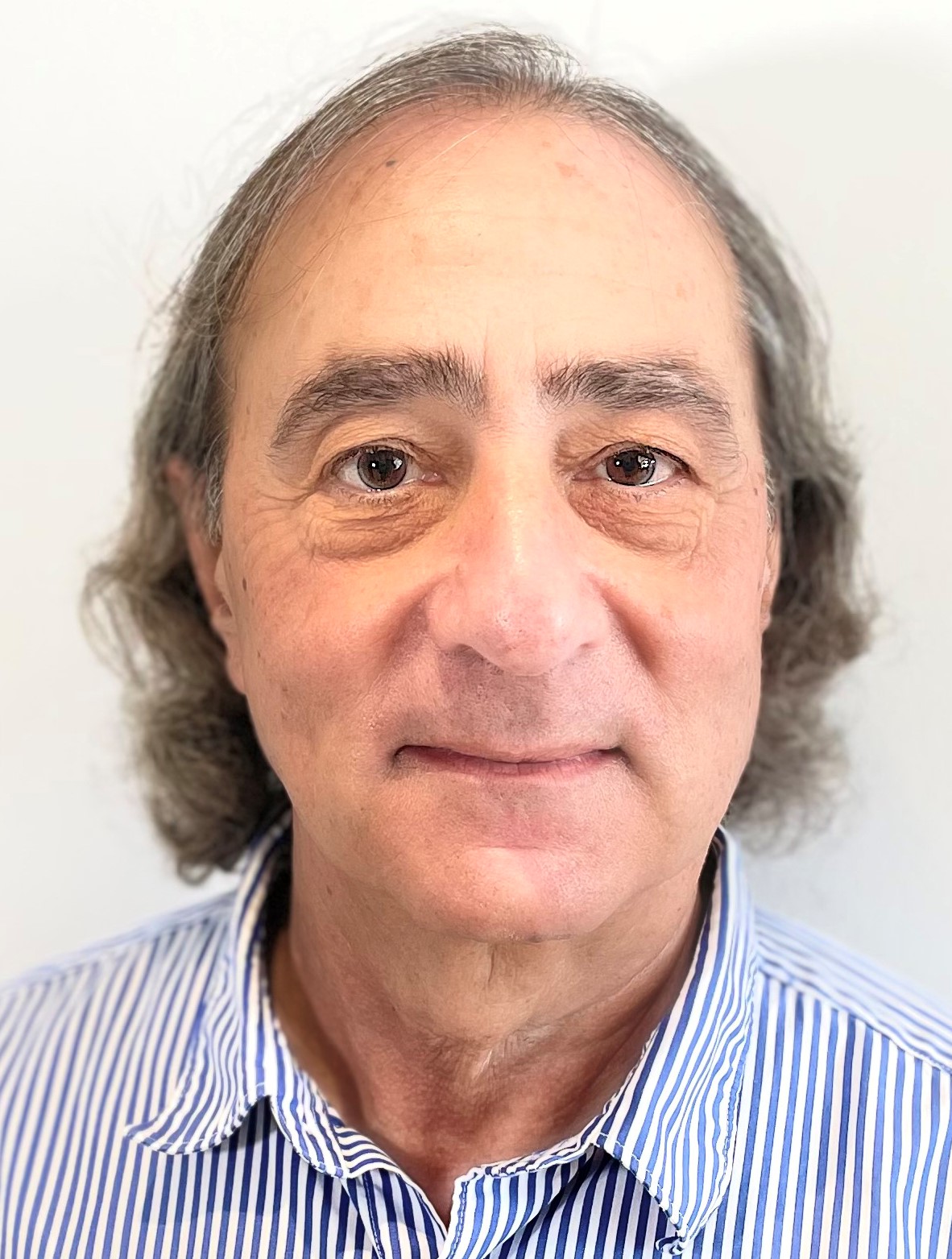Join us for the environMENTAL Summer School!

Are you a student or early career researcher interested in gaining a greater understanding on how environmental challenges affect mental health? Then join us for the Summer School on environment, brain and mental health, jointly organised by the Nature ‘Earth Brain Health Commission’, the Horizon Europe Project ‘environMENTAL’ and the German Centre for Mental Health (DZPG).
The summer school will take place at Charité Medical University, Campus Mitte, Berlin, Germany from 18. – 20. September 2024.
The Summer School will enable participants to apply cutting edge research to investigate the relation between environment, brain and mental health, ranging from global mental health studies, digital mental health, urbanicity, and virtual reality, Bayesian statistics as well as practical support on publishing in scientific journals.
We will offer a mix of masterclasses and hands on training by faculties of leading European, Asian and African institutions as well as Springer Nature.
Event Details:
Date: 18th – 20th September 2024
Location: Charité Universitätsmedizin – Berlin or online via Zoom
REGISTRATION FOR THIS EVENT IS ALREADY CLOSED.
For additional information, please contact:
Dr. Esther Hitchen, Project Manager, Charite Universitätsmedizin – Berlin
Vanessa Koehler, Project Manager, concentris
Topics:
- Digital mental health
- Virtual reality and mental health
- Earth systems and urbanicity
- Urban remote sensing and urban structure mapping
- Epidemiology and environment
- Global mental health
- Introduction to Bayesian statistics and machine learning
- How to write a paper and get published
Speakers:
- Prof. Vivek Benegal, Professor of Psychiatry, National Institute of Mental Health and Neuro Sciences, Bengaluru, India
- Prof. Rosa Barciela, Science Strategic Head of Ensembles Exploitation and Principal Scientific Consultant, Met Office, Exeter, UK
- Prof. Bin Chen, Assistant Professor, Division of Landscape Architecture, Hong Kong University, Hong Kong, China.
- Dr. Rebecca Cooney, Chief Editor of Nature Mental Health, Springer Nature Group, New York, United States
- Prof. Sylvane Desrivières, Professor of Biological Psychiatry, King’s College London, London, UK
- PD Dr. Soeren Hese, Professor of Remote Sensing, Institute for Geography, Friedrich Schiller University Jena, Jena, Germany
- Prof. Xanthe Hunt, Associate Professor of global health at Stellenbosch University, and an honorary specialist scientist at the South African Medical Research Council (SAMRC), Africa Health Research Institute, Stellenbosch University, Stellenbosch, South Africa
- Prof. Andreas Meyer-Lindenberg, Director of the Central Institute of Mental Health, Zentralinstitut für Seelische Gesundheit (ZI), Mannheim, Germany
- Prof. Andre Marquand, Principal investigator at Donders Centre for Cognitive Neuroimaging, Principal investigator at Donders Institute for Brain, Cognition and Behaviour, Radboud University Medical Centre, Nijmegen, The Netherlands
- Prof. Peng Gong, Chair Professor of Global Sustainability, Vice-President and Pro-Vice-Chancellor (Academic Development), Hong Kong University, Hong Kong, China
- Prof. Gunter Schumann, Distinguished Professor and Director, Centre for Population Neuroscience and Stratified Medicine (PONS) at ISTBI, Fudan University, Shanghai, China and Charité University Medicine Berlin, Berlin Germany
- Emin Serin, PhD Candidate, ECN Scholar, Research Assistant, Charité Universitätsmedizin, Berlin
- Prof. Mel Slater, Distinguished Professor, Department of Clinical Psychology, University of Barcelona, Barcelona, Spain
- Prof. Bernd Stahl, Professor of Critical Research in Technology, University of Nottingham, Nottingham, UK
- Prof. Mei Tian, Distinguished Professor of Fudan University, Fudan University, Shanghai, China and President of World Molecular Imaging Society (WMIS)
Agenda:
Masterclass timings subject to change.
Wednesday 18th September
Morning Session
9:00 –
Introduction (Prof. Gunter Schumann)

Prof. Gunter Schumann, Distinguished Professor and Director, Centre for Population Neuroscience and Stratified Medicine (PONS) at ISTBI, Fudan University, Shanghai, China and Charité University Medicine Berlin, Berlin Germany
Prof. Gunter Schumann MD PhD, Distinguished Professor and Director, Centre for Population Neuroscience and Stratified Medicine (PONS) at ISTBI, Fudan University, Shanghai and Charite University Medicine Berlin is an internationally renowned scientist who is shaping and coordinating European and global mental health research on prediction and neurobiological characterisation of mental disorders. In his research programmes he develops and applies population neuroscience and precision medicine in Europe and globally. His innovative approaches have led to the identification of disease mechanisms and biomarkers for prediction and stratification. They have been published in leading journals, including in Nature, Nature Medicine and Science. Professor Schumann conceived and is coordinating the environMENTAL Horizon Europe project aimed at reducing the impact of major environmental challenges on mental health. He also leads the IMAGEN project, a ground breaking imaging genetics study of 18 European partners initially funded by the European Commission, the STRATIFY study, funded by the European Research Council (ERC), and the Indian cVEDA study. He directs the Zhangjiang International Biobank at ISTBI, Fudan University. He is a recipient of prestigious awards, including an Advanced Grant of the ERC, a Humboldt Prize of the German Alexander von Humboldt Foundation. He received a Chinese National 1000 talent award and a NSFC Research Award for International Senior Scientists. He has attracted over 40 million Euro in grant funding.
9:15 –
Neural mechanisms of environmental risk and resilience (Prof. Andreas Meyer-Lindenberg)
Prof. Andreas Meyer-Lindenberg, Director of the Central Institute of Mental Health, Zentralinstitut für Seelische Gesundheit (ZI), Mannheim, Germany
Prof. Meyer-Lindenberg, since 2007 in Germany, is Director of the Central Institute of Mental Health, Medical Director of the Department of Psychiatry and Psychotherapy at the Institute, based in Mannheim and Professor and Chairman of Psychiatry and Psychotherapy at the University of Heidelberg in Heidelberg. He is board certified in psychiatry, psychotherapy, and neurology. Before 2007, he spent ten years as a scientist at the National Institutes of Mental Health, Bethesda, USA.
He is the author of more than 480 peer-reviewed articles and book chapters. He is continuously named as one of the most highly cited scientists in the world (www.isihighlycited.com). He is Editor-in-Chief of the new Journal of the ECNP Neuroscience Applied, associate editor of Science Advances and on the editorial board of a number of other journals.
His research interests focus on the development of novel treatments for severe psychiatric disorders, especially schizophrenia, through an application of multimodal neuroimaging, genetics and enviromics to characterize brain circuits underlying the risk for mental illness and cognitive dysfunction.
In recognition of his research, Prof. Meyer-Lindenberg has received awards throughout his career, including: Joel Elkes International Award for Clinical Research from the ACNP (2006), A.E. Bennett Award of the SfBP (2007), Kurt Schneider Scientific Award (2010), Hans-Jörg Weitbrecht-Preis für Klinische Neurowissenschaften (2011), ECNP Neuropsychopharmacology Award (2012), Prix ROGER DE SPOELBERCH (2014), CINP Lilly Neuroscience Clinical Research Award (2016), and the RobertSommer-Award (2023).
10:15 – COFFEE BREAK
10:45 –
Global Mental Health (Prof. Xanthe Hunt and Prof. Vivek Bengal)

Prof. Xanthe Hunt, Associate Professor of global health at Stellenbosch University, and an honorary specialist scientist at the South African Medical Research Council (SAMRC), Africa Health Research Institute, Stellenbosch University, Stellenbosch, South Africa
Prof Xanthe Hunt is a member of faculty at the Africa Health Research Institute (AHRI) in South Africa. She also holds extraordinary appointments as an Associate Professor of Global Health at Stellenbosch University and a Specialist Scientist at the Mental Health, Alcohol, Substance Use and Tobacco Research Unit of the South African Medical Research Council. Xanthe holds a PhD in psychology from Stellenbosch University and has postgraduate training from Harvard and Stellenbosch Universities in epidemiology, biostatistics, and research methods. Her expertise lies in examining mental health within the context of broader social determinants, such as violence, poverty, and access to technology, as well as the intersection of mental health and disability and sexual health. Her work has a focus on young people, and much of it foregrounds the use of participatory research methods to better understand lived experience of health conditions, and use this knowledge to develop interventions. Xanthe has worked across sub-Saharan Africa, including in Kenya, Tanzania, Mozambique, Malawi, and Zambia, and has led health systems’ strengthening initiatives, monitoring and evaluation projects, as well as a range of research studies including trials of digital mental health interventions for young people.

Prof. Vivek Bengal, Professor of Psychiatry, National Institute of Mental Health and Neurosciences, Bangalore, Karnataka, India
Dr. Vivek Benegal, Professor of Psychiatry, is currently the Chair of the Department of Psychiatry at and previous head of the Department of Psychosocial Support in Disaster Management at the National Institute of Mental Health and Neurosciences, India. He has been head of the National Centre of Excellence for Climate Change and Mental Health, Ministry of Health and Family Welfare, India and continues to be a member of the Technical Expert Group on Mental health related illness under the National Programme on Climate Change and Human Health.
He is one of the authors of the National Guidelines on Climate Change And Mental Health and drafted the National Action Plan For A Monitoring And Evaluation System for climate sensitive mental illnesses, and has contributed to the National Disaster Management Authority guidelines on Mental Health and Psychosocial Support Services in Disasters.
Dr. Benegal is Principal Investigator on the National Mental Health Surveys of India, which have a special emphasis on mental health in climate sensitive zones. He also leads the Task Force Project of the Indian Council of Medical Research, Pathways to Resilience and Mental Health (PARAM) which is a large longitudinal multi-site study assessing the impact of the exposome on neurodevelopmental trajectories and downstream vulnerability to mental illness, in a cohort spanning antenatal to young adult stages in subjects across India.
12:30 – LUNCH
Afternoon Sessions
13:30 –
Earth systems and urbanicity (Prof. Peng Gong and Prof. Bin Chen)

Prof. Peng Gong, Chair Professor of Global Sustainability, Vice-President and Pro-Vice-Chancellor (Academic Development), Hong Kong University, Hong Kong, China
Peng Gong is Chair Professor of global sustainability and Vice-President and Pro-Vice-Chancellor (Academic Development) of The University of Hong Kong. He was professor and Chair of the Department of Earth System Science, Dean of School of Sciences, at Tsinghua University (Beijing, China). He had taught in the Department of Geomatics Engineering at the University of Calgary (Canada) and the Department of Environmental Science, Policy and Management at the University of California, Berkeley (CA, USA). In 2000, he founded the International Institute for Earth System Science at Nanjing University (China) and in 2004, he served as the founding director of the State Key Laboratory of Remote Sensing Science.
His major research interests include mapping and monitoring of global environmental change, and modelling of environmentally related infectious diseases such as schistosomiasis, avian influenza, dengue, and COVID-19, and healthy cities.
He is the author/co-author of over 600 articles and 10 books. He chaired/co-chaired 9 research reports on climate change and health and healthy cities in China. Internationally, he has served as a member of the Earth League, the Future Earth Advisory Committee, the Earth Commission, and the Publishing Committee of the American Geophysical Union. He is also a member of the editorial board or advisory group of more than 10 international publications including the Lancet.

Prof. Bin Chen, Assistant Professor, Division of Landscape Architecture, Hong Kong University, Hong Kong, China.
Dr. Bin Chen is Assistant Professor at the Faculty of Architecture, HKU-100 Scholar, and Director of Future Urbanity & Sustainable Environment (FUSE) Lab at the University of Hong Kong. His research mainly focuses on remote sensing and geospatial big data analysis for environmental change studies. He has published more than 70 SCI journal articles, including Science, Nature Sustainability, Nature Communications, PNAS, Remote Sensing of Environment, ISPRS P&RS, etc. He is the Associate Editor of Remote Sensing in Ecology and Conservation. He received the Geospatial World 50 Rising Stars Award, International Society for Digital Earth Young Scientist Award, Global Young Scientist Award at World Geospatial Developers Conference, AAG Early Career Award in Remote Sensing, ISPRS Best Young Author Award, and Li Xiaowen Remote Sensing Excellent Youth Award, etc.
15:30 – COFFEE BREAK
16:00 –
Climate, extreme weather and health (Prof. Rosa Barciela)

Prof. Rosa M. Barciela Fernandez, Science Strategic Head of Ensembles Exploitation and Principal Scientific Consultant, Met Office, Exeter, UK
Prof. Rosa Barciela is Science Strategic Head of Ensembles Exploitation and Principal Scientific Consultant at the UK Met Office. She is also a Professor of Climate, Environment and Public Health at the University of Exeter’s European Centre for Environment and Human Health.
Prof. Barciela has been working in the confluence of weather, climate and environment for over 20 years, with an emphasis in bridging the gap between science and society, taking a system’s approach in connecting research and the need for high quality, actionable information, with a strong user focus.
Prof. Barciela has been linking weather, climate, environment and human health research and policy for nearly a decade, addressing real-world challenges across the environment, public health, water, energy, marine and food security nexus, leading trans-disciplinary teams, nationally and internationally. She works with governments, public, private and third-party sectors. She holds senior roles at multiple organisations, such as UK National Focal Point for Integrated Health Services (at the World Meteorological Organisation) and was a prominent member of the World Meteorological Organisation SARS-CoV-2/COVID-19 Task Team.
She has led multiple international, multi-cultural consortia as Principal Investigator, including the bilateral UK-South Africa Weather and Climate Science for Services Partnership (WCSSP) and the Foreign, Commonwealth and Development Office’s Early Action for Cholera Project, to name a few.
Prof. Barciela has written over 80 peer-reviewed papers and customer reports as well as invited op-ed pieces. Her work has featured in the media, including prime time live interviews.
Thursday 19th September
Morning Session
9:00 –
Responsible innovation in neuroscience (Prof. Bernd Stahl)

Prof. Bernd Stahl, Professor of Critical Research in Technology, University of Nottingham, Nottingham, UK
Bernd Carsten Stahl is Professor of Critical Research in Technology at the School of Computer Science of the University of Nottingham. His interests cover philosophical issues arising from the intersections of business, technology, and information. This includes ethical questions of current and emerging of ICTs, critical approaches to information systems and issues related to responsible research and innovation.
His work on ethical issues of technology led to his involvement in projects involving the intersection of ICT and neuroscience. He served as Ethics Director of the EU Flagship Human Brain Project from 2013 to 2023 where he was responsible for overseeing the ethics-related processes of the project and contributed to the development of approaches to responsible research and innovation across the project.
The Nature Commission is centrally concerned with bringing together data across disciplines and domains, thus relying on close collaboration of ICT, neuroscience, and other disciplines. This interdisciplinary collaboration will raise ethical questions both with regards to the process of doing the research and with regards to outcomes and findings which is Stahl’s area of expertise.
10:00 –
Omics and Brain (Prof. Sylvane Desrivières)

Prof. Sylvane Desrivières, Professor of Biological Psychiatry, King’s College London, London, UK
Sylvane Desrivières is Professor of Biological Psychiatry at King’s College London, and a member of several large international neuroimaging x genomic consortia aimed at identifying and characterizing genomic and molecular signatures related to brain and behaviour: she sets up and lead the ENIGMA-Epigenetics, a Working Group part of the international Enhancing NeuroImaging Genetics through Meta-Analysis (ENIGMA) consortium that investigates how epigenetic factors ––alone or in combination with genetic factors– shape the brain throughout the lifetime; she leads multi-omics Work Packages in longitudinal studies of adolescents (IMAGEN and Consortium on Vulnerability to Externalizing Disorders and Addictions (c-VEDA)) and the environMENTAL project. She has always been involved in research on genetic control of biological functions in systems of increasing complexity over the years. When in the early 2000s, advances in the fields of neuroimaging had reached the stage where measuring changes of the brain in vivo had become a reality, she took this exceptional opportunity and challenge to move her career from the genetic bases of cancer to investigate the impact of genes on the human brain. Her research combines Magnetic Resonance Imaging with genetics and other ‘omics analyses to investigate brain-behaviour relationships and understand why some people are at risk of developing neuropsychiatric disorders and not others.
A recent focus of her research aims at understanding, preventing, and developing new therapeutic approaches for eating disorders. She is Deputy Lead for the Eating Disorders and Obesity Theme from the National Institute for Health Research (NIHR) Biomedical Research Centre (BRC) at South London and Maudsley NHS Foundation Trust (the largest mental health provider in Europe), and King’s College London. It is the only BRC specialising in mental, aiming to accelerate the translation of the latest scientific discoveries into clinical trials and other well-designed studies. She is also PI of several UKRI-funded projects that recruit and study participants with eating disorders (ESTRA project, PI; EDIFY project, co-I), depression and alcohol use disorders (STRATIFY, co-I), with the aim to improve our neurobehavioral knowledge of eating disorders and their comorbidities.
These activities resulted in > 160 publications in the past 10 years, including Nature Medicine 2023; Biological Psychiatry 2023; Nature 2022; Nature Neuroscience 2022; Molecular Psychiatry 2021; Nature Genetics 2019; Nature Human Behavior 2019; Nature. 2015; Molecular Psychiatry 2015. This innovative approach to science and achievements have largely been made possible by combining data from cohorts around the world to achieve large sample sizes.
11:00 – COFFEE BREAK
11:30 –
Phenomics (Prof. Mei Tian)

Prof. Mei Tian, Distinguished Professor of Fudan University, Fudan University, Shanghai, China and President of World Molecular Imaging Society (WMIS)
Dr. Mei Tian is the Distinguished Professor of Fudan University, and the Executive Dean of the Institute of Human Phenome, Fudan University, Shanghai, China. She serves as the President of World Molecular Imaging Society (WMIS), Vice President of Chinese Society of Cognitive Sciences (CSCS).
Prof. Tian has nearly 30 years post-MD training and practice in radiology, nuclear medicine and molecular imaging. She received her PhD and post-doc fellowship in Japan, and completed her clinical fellowship on radio-oncology and nuclear oncology at the Department of Radiology, Dana-Farber Cancer Institute/Brigham and Women`s Hospital, Harvard Medical School, and served as the Assistant Professor at the University of Texas MD Anderson Cancer Center, Distinguished Professor at the Second Hospital of Zhejiang University School of Medicine. Currently, she is the Senior Clinical Consultant of the Department of Nuclear Medicine and PET Center, Huashan Hospital of Fudan University.
Prof. Tian is the Fellows of the World Molecular Imaging Society (WMIS) and the Royal Society of Chemistry (RSC). She is serving as the associate editor of the official journals of leading societies in the field of molecular imaging and nuclear medicine, including the WMIS, the Society of Nuclear Medicine and Molecular Imaging (SNMMI), European Association of Nuclear Medicine (EANM), and the editorial consultant of The LANCET.
12:30 – LUNCH
Afternoon Sessions
13:30 –
Virtual Reality and Mental Health (Prof. Mel Slater)

Prof. Mel Slater, Distinguished Professor, Department of Clinical Psychology, University of Barcelona, Barcelona, Spain
Mel Slater is a Distinguished Investigator at the University of Barcelona in the Institute of Neurosciences, and co-Director of the Event Lab (Experimental Virtual Environments for Neuroscience and Technology). He was previously Professor of Virtual Environments at University College London in the Department of Computer Science. He has been involved in research in virtual reality since the early 1990s, and has been first supervisor of 40 PhDs in graphics and virtual reality since 1989. He held a European Research Council Advanced Grant TRAVERSE 2009-2015 and has now a second Advanced Grant MoTIVE 2018-2023. He is a Research Award Winner of the Alexander von Humboldt Foundation in 2021, and was elected to the IEEE VGTC Virtual Reality Academy in 2022. He is Field Editor of Frontiers in Virtual Reality, and Chief Editor of the Human Behaviour in Virtual Reality section. His publications can be seen on http://publicationslist.org/melslater.
15:30 – COFFEE BREAK
16:00 –
Urban remote sensing and urban structure mapping (PD Dr. Soeren Hese)

PD Dr. S. Hese, Professor of Remote Sensing, Institute for Geography, Friedrich Schiller University Jena, Jena, Germany
Sören Hese received a Master of Science in Remote Sensing from the Department of Electronic Engineering and Physics, University of Dundee, United Kingdom in 1995, a Ph.D. (Dr. rer. nat.) at the Institute of Landscape and Environmental Planning from the Technical University Berlin and since 2011 holds the German post-doctoral lecturer qualification. He worked at Lund University (Sweden) for forest damage assessment and deforestation mapping and until 2001 at the German Aerospace Center at the Institute for Planetary Exploration. Between 2002 and 2005 he worked as postdoc as project coordinator of the SIBERIA-II EU FP5-project “Multi-Sensor Concepts for Greenhouse Gas Accounting of Northern Eurasia” and co-developed the CARBON-3D mission and sensor concept. Since 2003 Sören Hese holds a permanent position at the Department for Earth Observation at Friedrich-Schiller-University of Jena as expert in spatial very high-resolution data analysis using UAV systems, airborne scanner data and orbital systems for applications in change detection, object-oriented image analysis and using deep learning data classification techniques. Thematic applications range from flood modelling, oil spill contamination mapping, urban high resolution object classification and urban structure mapping scenarios as well as UAV point cloud analysis of vegetation and UAV based forest degradation analysis. Sören Hese has 20 years of teaching experiences in the field of image processing, remote sensing, GIS and physical basis of Earth observation and applied remote sensing theory and lectures for the BSc/MSc course level. Sören Hese was supervisor of the winning author group of the international GRSS data fusion contest in 2012. In 2020 he took an interim professorship at Martin-Luther University Halle and from 2021 to 2022 he worked as a professor for Remote Sensing and Geoinformatics at the Free University Berlin.
PD Dr. S. Hese
Department for Earth Observation
Friedrich-Schiller-University Jena
Löbdergraben 32
07743 Jena
Germany
Phone: +49 3641 948873
Email: soeren.hese@uni-jena.de
Web: https://www.geographie.uni-jena.de/26/fernerkundung
Researchgate: https://www.researchgate.net/profile/Soeren-Hese
Friday 20th September
Morning Session
9:30 –
Bayesian statistics (Prof. Mel Slater)

Prof. Mel Slater, Distinguished Professor, Department of Clinical Psychology, University of Barcelona, Barcelona, Spain
Mel Slater is a Distinguished Investigator at the University of Barcelona in the Institute of Neurosciences, and co-Director of the Event Lab (Experimental Virtual Environments for Neuroscience and Technology). He was previously Professor of Virtual Environments at University College London in the Department of Computer Science. He has been involved in research in virtual reality since the early 1990s, and has been first supervisor of 40 PhDs in graphics and virtual reality since 1989. He held a European Research Council Advanced Grant TRAVERSE 2009-2015 and has now a second Advanced Grant MoTIVE 2018-2023. He is a Research Award Winner of the Alexander von Humboldt Foundation in 2021, and was elected to the IEEE VGTC Virtual Reality Academy in 2022. He is Field Editor of Frontiers in Virtual Reality, and Chief Editor of the Human Behaviour in Virtual Reality section. His publications can be seen on http://publicationslist.org/melslater.
11:00 – COFFEE BREAK
11:30 –
Machine learning (Prof. Andre Marquand and Emin Serin)

Prof. Andre Marquand, Principal investigator at Donders Centre for Cognitive Neuroimaging, Principal investigator at Donders Institute for Brain, Cognition and Behaviour, Radboud University Medical Centre, Nijmegen, The Netherlands
Professor Andre Marquand leads the Predictive Clinical Research group at the Donders Institute for Brain, Cognition and Behaviour, Radboud University Medical Centre in the Netherlands. He is the recipient of multiple prestigious awards including a consolidator grant from the European Research Council and awards from the Dutch Institute for Scientific Research and the UK Wellcome Trust. His research focusses on the development of statistical and machine learning techniques and their application to large population-level biomedical data biomedical data, including neuroroimaing, real-time smartphone monitoring and environmental data. The aims of this research line are to better understand the heterogeneity underlying mental health conditions and to develop tools for predicting their course and outcome.

Emin Serin, PhD Candidate, ECN Scholar, Research Assistant, Charité Universitätsmedizin Berlin, Berlin, Germany
Emin Serin is a PhD candidate in Predictive Clinical Neuroscience at the Research Division of Mind and Brain, Charité-Universitätsmedizin Berlin, supervised by Prof. Dr. Henrik Walter. His research interests lie in advanced machine learning applications (e.g., deep learning and normative modeling), functional MRI, graph theory, and their implications for understanding mental disorders. His ongoing research is focused on generating synthetic task-based functional MRI (fMRI) contrasts from resting-state connectome using deep learning methods, extracting fMRI-based biomarkers for various mental disorders, and quantifying individual-level heterogeneity in brain-derived phenotypes on a population scale through normative modeling.
Emin holds a Bachelor of Science in Psychology from the Izmir University of Economics and a Master in Neuroscience from the Berlin School of Mind and Brain. During his Master’s, he developed an open-source toolbox, NBS-Predict, to easily perform connectome-based predictions. He is also affiliated with the Einstein Center for Neurosciences Berlin and the Berlin Center for Computational Neuroscience.
13:00 – LUNCH
Afternoon Sessions
14:00 –
How to write a paper and get published - Part I (Dr. Rebecca Cooney)

Dr. Rebecca Cooney, Chief Editor of Nature Mental Health, Springer Nature Group, New York, United States
Rebecca “Bek” Cooney is the Chief Editor of Nature Mental Health. Before joining the Nature Group in 2022, she served as the North American Executive Editor of The Lancet and the Assistant Editor of The Annals of the New York Academy of Sciences. She received her PhD in Psychology from Stanford University in 2007, where her work focused on the neural basis of mood and anxiety disorders and rumination in depression using fMRI. She subsequently trained as a postdoctoral fellow in Child and Adolescent Psychiatry at the New York State Psychiatric Institute/Columbia University, where she studied inhibitory function in obsessive-compulsive disorder. Her research interests include a broad range of topics in psychology and psychiatry, clinical trials, public health policy, and health equity. Bek lives and works in New York City.
15:30 – COFFEE BREAK
16:00 –
How to write a paper and get published - Part II (Dr. Rebecca Cooney)

Dr. Rebecca Cooney, Chief Editor of Nature Mental Health, Springer Nature Group, New York, United States
Rebecca “Bek” Cooney is the Chief Editor of Nature Mental Health. Before joining the Nature Group in 2022, she served as the North American Executive Editor of The Lancet and the Assistant Editor of The Annals of the New York Academy of Sciences. She received her PhD in Psychology from Stanford University in 2007, where her work focused on the neural basis of mood and anxiety disorders and rumination in depression using fMRI. She subsequently trained as a postdoctoral fellow in Child and Adolescent Psychiatry at the New York State Psychiatric Institute/Columbia University, where she studied inhibitory function in obsessive-compulsive disorder. Her research interests include a broad range of topics in psychology and psychiatry, clinical trials, public health policy, and health equity. Bek lives and works in New York City.
Storage of registration data:
The registration data for this event is stored on servers located in Germany. Please note that this information will be stored until the day after the event and will then be deleted.
We would like to assure you that we process and protect your data in accordance with applicable data protection regulations. For questions and/or comments on the storage of registration data please contact us by using the following contact details:
concentris research management gmbh
Ludwigstr. 4
82256 Fürstenfeldbruck
Germany
Website: www.concentris.de
Email: contact@concentris.de
Phone number: +49 (0)8141 625 285 84

